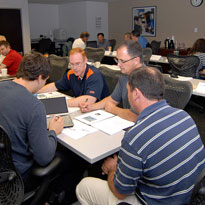SIP Workshop
- Course:SIP Workshop
- Course ID:SIPWS Duration:2-3 days Where: Your Office (7+ Persons)
- Download Course Description (PDF)
Available as a private, customized course for your group at your offices or ours and in some cases as a WebLive(TM) class.
Course Outline
- Course Intro: Lecture
- Overview
- ClearSight Analyzer
- Logistics and Labs
- SIP Overview: Lecture
- SIP Servers
- Proxy Servers
- Redirect Servers
- Location and Directory Servers
- Registration
- Locating SIP Servers
- SIP Messages and Procedures
- Message Structure
- Requests and Responses
- Addressing
- Completion/Error Codes
- Basic Call Flows and Service Examples
- Media Streams/Packets in SIP Sessions
- RTP/RTCP
- Media Coding
- Session Description Protocol (SDP)
- SIP Servers
- SIP Workshop Lab
- Call Set-Up
- Invite
- SDP
- Media Streams/Packets
- RTP/RTCP
- Media Coding
- Content Monitoring
- Call Tear-Down
- Call Set-Up
- SIP-T Overview: Lecture
- Telephony Trunking Overview
- TDM vs Packet Voice
- SIP-T Messages and Procedures
- Message Structure
- Requests and Responses
- Addressing
- Completion/Error Codes
- Basic Call Flows and Service Examples
- Media Streams/Packets
- Error Conditions
- Skinny Workshop Lab
- Call Set-Up
- Media Streams/Packets
- RTP/RTCP
- Media Coding
- Content Monitoring
- Call Tear-Down
- Top 5 VoIP Problems LABs
- Phone Connectivity: Lab
- Analyze and Troubleshoot Call Traces of Phone Connectivity Problems in a SIP Environment.
- LAB Debrief: Group Discussion
- Call Connection Lab
- Detect Call Connection Problems and Suggest Solutions from SIP Call Traces in a Small Enterprise or Carrier IP Telephony Example
- LAB Debrief: Group Discussion
- Call Echo Lab
- Determine Source of Echo, Troubleshoot Echo Cancellation Issues and Consider the Contribution of Electrical vs Acoustic Echo to Call Degradation
- LAB Debrief: Group Discussion
- Broken Speech/Dropped Calls
- Perform Root Cause Analysis on SIP Call Traces for Two of the Most Pervasive Problems in VoIP
- LAB Debrief: Group Discussion
- Voice Quality/QoS/QoE Lab
- View and Dissect Quality of Service (QoS) and Quality of [User] Experience (QoE) Issues on SIP Call Traces, Understand Differences in MOS and R-Values and Calculations Relative to Different Call Types, and Listen to Media Samples of Impairments
- LAB Debrief: Group Discussion
- Course Recap, Q/A, and Evaluations
Course in a Nutshell
This workshop offers a deep dive into the intricacies of the Session Initiation Protocol (SIP) and related protocols. While basic protocol operation is covered, the emphasis is on problem isolation and trouble shooting of problems that are often encountered while implementing SIP and the associated SIP trunking protocol, SIP-T. The course is predominantly hands-on, with the structured or independent discovery labs accounting for over two thirds of the class time.
Customize It!
We can adapt this course to your group’s background and project requirements at little to no added charge. Depending on your needs, the course can be tailored to emphasize certain topics, include more or fewer labs, or made more or less technical.
Learn How To
- Understand the internal protocol operations of SIP and SIP-T
- Describe and troubleshoot call set up, media transport, and call tear down for SIP and SIP-T
- Analyze and troubleshoot call traces of phone connectivity problems in a SIP environment
- Detect call connection problems and suggest solutions from SIP call traces in a small enterprise or carrier IP telephony example
- Determine source of echo, troubleshoot echo cancellation issues, and consider the contribution of electrical vs acoustic echo to call degradation
- Perform root cause analysis on SIP call traces for two of the most pervasive problems in VoIP: broken speech and dropped calls
- View and dissect Quality of Service (QoS) and Quality of [User] Experience (QoE) issues on SIP and SIP-T call traces, understand differences in MOS and R-Values and calculations relative to different call types, and listen to media samples of impairments
Aimed At
If you are a communications, systems, or software engineer; data network, telephony, IT, or marketing/sales professional; or technical or strategy manager or consultant who needs a detailed, hands-on understanding of SIP, this course is for you.
Prerequisites
The above course, or equivalent knowledge/experience, is a recommended prerequisite.

